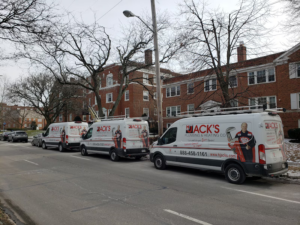H. Jack's Plumbing Crews Repair Frozen Water Lines for Displaced Apartment Residents
By Tom Jewell, Special to cleveland.com
Although a new boiler arrived within about three weeks after the City of Shaker Heights issued its only “order to vacate” of the season on Jan. 3, further complications arose when water lines subsequently froze in the building. As a result, it was all hands on deck with additional plumbing crews shown here Feb. 14. Tenants were finally moved out of their hotel lodgings and back home in mid-March.

SHAKER HEIGHTS, Ohio — City officials continue to look at a more proactive approach to code enforcement — including civil penalties against landlords — for the 104 apartment buildings in town.
It works out to 5,638 units, with residents in 132 of those (2.3 percent) finding themselves with “low or no heat” this year.
Tenants in a 19-unit apartment building on Fairhill Road have now returned home — well over two months after the city issued an “order to vacate” in early January due to their boiler conking out in the dead of winter.
The building owner, Pero Real Estate Investment, contracting with Brick & Mortar Property Management, put those residents up in a hotel throughout the ordeal.
Although a new boiler arrived by the end of January, further complications arose after the connecting steam pipes in the building burst at some point along the way.
Shaker Heights Building and Housing Director Kyle Krewson told council at a March 4 work session that 94 percent of the apartments with low or no heat this year are owned by Pero.
With an order to vacate at another Pero apartment building issued by the city in 2023 for a “catastrophic boiler failure” there as well, Councilwoman Nancy Moore said it’s gotten to be a repetitive cycle.
“Clearly those ‘proactive’ (annual) state inspections of heating systems are not solving the problems that we’re having with Pero and the failure of boilers,” Moore said.
Krewson said it has more to do with the mechanics of boilers — in spite of the annual licensing inspections by the Ohio Division of Industrial Compliance.
“Even if we had someone going in and inspecting a boiler on a weekly basis, these systems will still go down and fail over time,” Krewson said.
He noted that a lot of the systems are just older and on “borrowed time.”
As for an increase in boiler inspections, “I don’t know if that would move the needle at all,” Krewson said.
‘Different angle’
There could be an upswing in other city inspections, Shaker Heights Chief Administrative Officer Jeri Chaikin told council.
She’s already been working with the building and fire departments on what might help to address Shaker’s aging multi-family properties.
“We’re looking at something for council to consider for next year’s budget,” Chaikin said.
“We’re talking about the same buildings and coming at it from a different angle.”
The law department may also be on board with the possibility of civil penalties, something that Krewson said the City of Cleveland recently imposed.
“I could see benefits in those instances where we’re constantly chasing our tail — we go out, we issue a violation notice, they correct it, we clear the notice, we go back out,” Krewson said.
“It’s just cyclical.”
Situations involving elevators, rubbish collection, issues around dumpster areas and rodent infestations might be some of the enforcement areas that could benefit from civil fines.
Moore noted that another issue involves “a revolving door of maintenance people at many of these companies that strikes me as being almost a tactic of delay and inefficiency in terms of repairs.”
Krewson said the importance of establishing a relationship between the city and apartment property managers cannot be overstated.
“I have many of the property managers on my phone’s speed dial,” Krewson added.
“That being said, we are willing and ready to take it to prosecution if that’s the only avenue that’s going to be productive for us.”
Krewson added that property managers provide needed “boots on the ground.”
But they can get frustrated, too, if they’re not getting the support and the money they need to make necessary repairs and be effective at their job.
He noted that in at least one case, the city is dealing with a fourth or fifth property manager over the course of the last 18 months.
“We make some headway and then they’re gone,” Krewson said.
“Tenants are feeling the same pain points, every time they pick up the phone to call, find themselves talking to a new person, so they have to start all over.”
Stopping short of calling it a “tactic,” Krewson said it has certainly become a challenge.
“And it’s possibly more of a systemic problem in a financial sense with the owner than anything else,” Krewson added.
Moving forward
Based on the work session, a council majority already favors more proactive enforcement, with increased inspections for landlords and property managers considered to be “priorities.”
This comes after the nonprofit Shaker Square Alliance sent a letter to council with a number of recommendations at the end of January.
Krewson disputed some of the statements in the letter, including one that the city only goes through apartment buildings for point-of-sale inspections.
While it might seem like that, “keep in mind we’ve had 46 percent of all our apartment buildings transferred since the pandemic began,” Krewson said, calling it an “astronomical number.”
But regular inspections are conducted every three years on apartment buildings through the city’s rental license program, with 48 buildings inspected within that time.
Another 32 buildings received point-of-sale inspections, leaving about 24 currently due.
The focus will be on common areas, roofs, major mechanical systems, building exteriors and other targeted areas at an inspector’s discretion.
Responding to a question from Vice Mayor Carmella Williams, Krewson said the goal for 2025 will be to catch up fully in the rental inspection program.
Calling it a “tricky and frustrating issue,” Councilman Sean Malone asked if the city had enough inspectors.
Councilman Ifeolu A.C. Claytor agreed that “codifying something and being able to enforce it are two different things.”
He told Krewson that “our intent is not to overload your department.”
Councilwoman Kim Bixenstine followed up on points about aggressive enforcement and possibly having inspections more frequently than every three years.
“It does seem to me that it would be worth it to look at whether those responsible for the vast majority of complaints and violations could be put on a more frequent inspection schedule.”
Krewson said the city cannot appear “arbitrary or capricious” in its approach to targeted enforcement.
However, “the idea of making the annual license contingent on inspection does have some appeal for properties we know are a problem,” Krewson said.
He mentioned the possibility of raising penalties for non-compliance, as well — “monetary or otherwise.”
Also attending the Zoom meeting, the city’s new Assistant Director of Housing Inspections Clifford Scott greeted council and took some notes on developing creative approaches this year.
